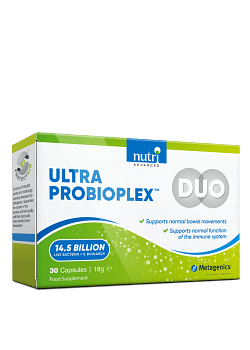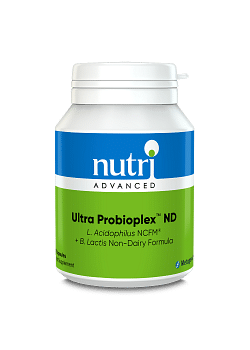What Causes Wind, Constipation & Diarrhoea?
Why you can trust Nutri Advanced Every article on our site is researched thoroughly by our team of highly qualified nutritionists. Find out more about our editorial process.
Uncomfortable problems such as constipation, wind and diarrhoea are something that we all experience from time to time, yet most of us are too embarrassed to talk about them. We thought we’d set the record straight to get you thinking and talking a bit more about these essential aspects of your gastrointestinal health. Here we explain what causes these common problems and what you can do about them if they’re more than just an occasional occurrence for you.
What causes wind?
1 in 10 visits to a UK GP relate to a digestive complaint and the most common symptoms are pain and bloating - where the abdomen feels full and tight. Intestinal gas usually goes hand in hand with bloating, and you might want to discover the best supplements for bloating and digestion if you experience this regularly. One of the most common reasons for excess wind is undigested food. Low stomach acid and/or a lack of digestive enzymes can result in undigested food passing through the intestines – bacteria then go to work on the undigested food and generate gas. Eating on the run, eating too quickly and stress can all get in the way of good digestion and so can contribute to excess gas in the same way. Some foods and drinks are more likely to produce gas too, so watch your intake of foods such as beans, chickpeas and lentils, cabbage, broccoli, Brussels sprouts and sugar alcohols found in sugar-free foods (sorbitol, mannitol and xylitol) and carbonated drinks and beer if you’re suffering from bloating and wind.
What you can do about it:
• Try natural plant digestive enzymes to support healthy digestion
• If your stomach acid is low you can supplement with Betaine HCl with added pepsin.
• Supplement with high quality probiotics to support beneficial bacteria
• Make more time for meals and chew your food properly
• Relax and de-stress
• Minimise intake of gas-forming foods such as beans, lentils, cabbage and alcohols found in sugar-free foods and carbonated drinks and beer.
What causes constipation?
Constipation is an uncomfortable and common condition that affects people of all ages. It can mean that you are not passing stools regularly or you’re unable to completely empty your bowel. It can also cause stools to be hard and lumpy or unusually large or small. Constipation can come and go quickly or can be a longer lasting more chronic condition. Common causes are dehydration, lack of fibre in the diet, low magnesium, inactivity and stress.
What you can do about it:
• Increase intake of fibre-rich foods such as oats, barley, wholegrains, fruits and vegetables, nuts and seeds.
• Drink more water
• Move more – regular exercise helps to support bowel motility
• Supplement with psyllium husk fibre, apple pectin and pureed papaya to support regular elimination
• Boost your magnesium levels with magnesium in the form of glycinate.
What causes diarrhoea?
Diarrhoea is a problem everyone is familiar with and is characterized by abnormally loose or watery stools. It can be acute, persistent or chronic. Common causes include infection with bacteria, parasites or viruses, food intolerance such as lactose intolerance, lack of beneficial bacteria, medication or stress. It can also be a symptom of more serious underlying conditions such as inflammatory bowel diseases, Crohn’s disease or ulcerative colitis. Dietary factors such as low soluble fibre can cause diarrhoea too.
What can you do about it?
• Drink plenty of water – diarrhoea can soon cause dehydration. You may also need to replace electrolytes (sodium, chloride & potassium) if it persists
• If bacterial or parasite infection is at the root cause you can try natural anti microbial agents such as berberine, grapefruit seed, garlic, black walnut, oregano oil and caprylic acid.
• Increase sources of soluble fibre such as oats, barley and rice.
• Supplement with high quality probiotics to support beneficial bacteria. Choose a product that contains specific bacterial strains that have been extensively researched to demonstrate their effectiveness. Well researched strains include Lactobacillus acidophilus NCFM®, Lactobacillus paracasei lpc-37, Bifidobacterium lactis Bi-04, Bifidobacterium lactis Bi-07 & Saccharomyces boulardii. Saccharomyces boulardii has been shown to be particularly helpful for improving diarrhoea.
This website and its content is copyright of Nutri Advanced ©. All rights reserved. See our terms & conditions for more detail.
Nutri Advanced has a thorough research process and for any references included, each source is scrutinised beforehand. We aim to use the highest value source where possible, referencing peer-reviewed journals and official guidelines in the first instance before alternatives. You can learn more about how we ensure our content is accurate at time of publication on our editorial policy.
Most Popular Articles
-
7 Surprising Ways To Support Your Magnesium
If you are displaying signs of a magnesium deficiency, here are 7 ways to boost your magnesium levels that are easy to incorporate into your daily life. -
5 Best Vitamin C Supplements Picked By Our Experts
Learn more about the different types of vitamin C, the different benefits you get from different types, and what you get for spending more on a good supplement. -
Top 5 Vitamins For Energy And Tiredness Picked By Our Experts
The 5 best and most important vitamins for energy & tiredness including B vitamin food sources & best supplement forms for energy. -
Benefits of Myo-Inositol for Polycystic Ovary Syndrome (PCOS)
In this research review article, we take a closer look at a lesser-known natural compound called myo-inositol that has been found to have significant potential to improve many of the prevalent features of PCOS. -
Top 10 Reasons to Give Your Kids Omega-3
Read the top 10 reasons that kids should have plenty of Omega-3- an essential fatty acid- including for depression, brain function, sleep & reading/maths skills.















